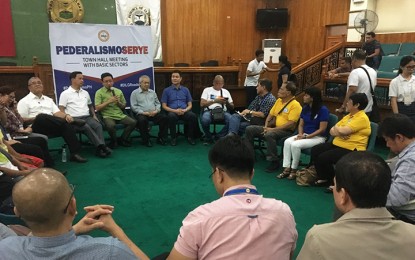
DILG Assistant Secretary Jonathan Malaya (speaking, in green shirt) together with other federalism experts conduct a dialogue with basic sectors of Albay during the "Pederalismoserye" town hall meeting at Sangguniang Panlalawigan Hall on Friday. (Photo by Connie Calipay)
LEGAZPI CITY -- In a bid to understand and address the concerns of the proposed draft Federal Constitution and the change from a unitary to a federal form of government, the Department of Interior and Local Government (DILG) together with federalism experts sat down and answered questions raised by the basic sectors of Albay including farmers, the academe, the Church, and the labor sector during the "Pederalismoserye" town hall meeting at the Sangguniang Panlalawigan Hall on Friday.
“Bicol as a federated region will have more power and funds to initiate projects that would develop the geothermal energy it sends out to the different parts of Luzon,” DILG Spokesperson Assistant Secretary Jonathan Malaya said.
Malaya said while the Bicol region has Mt. Mayon which is a major source of the country’s geothermal energy, the region currently experiences power outages and blackouts, which he called a "paradox."
Under a federal system, Malaya said local governments will have more freedom to enter into joint ventures with the private sector in order to generate more revenues for the region.
The regional government, on the other hand, will no longer have to go through the long and tedious process of approval from the national government, he said.
Presently, all LGUs have to submit their public-private partnership proposals to the central government pending review and approval of the National Economic and Development Authority (NEDA).
Volunteers Against Crime and Corruption (VACC) consultant Bartolome Roa Rayco, for his part, said Bicolanos will strongly support federalism if it will reduce the price of electricity in the region.
“We have higher rates than Meralco. We are paying more for the transmission cost, but should have special transmission rates para maka-attract kami ng mga investors (so we can attract investors),” he said.
“It’s true, because of the problems in electricity, ayaw pumasok ng mga investors sa Bicol (the investors don't come in Bicol),” Rosemarie Quinto Rey, President of the Albay Chamber of Commerce and Industry, added.
This can be addressed, according to Malaya, when the federated region is able to craft its own policies on investments.
According to former deputy presidential spokesperson Gary Olivar, regional governments have the capacity to enact incentives and rules and regulations for the business sector.
“Right now, the priority destination of power supply goes to Metro Manila and the bigger cities. But under a federal setup, Bicol region will have more share in the decisions about the distribution of cheaper and consistent power to barangays and communities,” Institute of Political and Electoral Reform (IPER) Executive Director Ramon Casiple said.
“Let’s maintain the good features of the existing system and improve on it under a federalized government,” Malaya said.
Malaya said the "federal way of thinking" gives the region a share in the decision-making process in the national policies.
Federalism will also fix the problems of corruption in government because under a federal setup, each region will have its own judiciary system, he added.
“Kung ako tatanungin niyo, masasabi ko na bulok ang justice system kaya pag bago na ang constitution, mayroon ng sariling judicial system ang rehiyon (If you ask me, the justice system is rotten. So if there's a new constitution in place, each region will have its own judicial system),” Presidential Anti-Corruption Commission Chairman Dante Jimenez, for his part, said.
Federalism is one of the Duterte administration’s flagship campaign which is seen to solve inequality, political and economic monopolies, and inefficiency in governance.
This week, the Concom approved and signed the proposed model for constitutional reform. (PNA)
